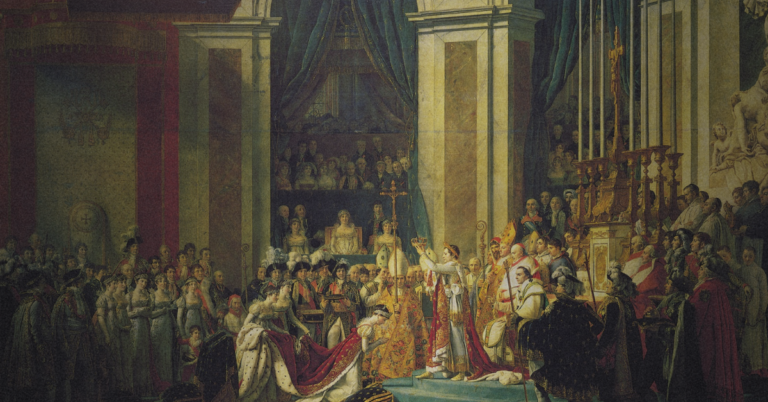Perfectionism is everywhere in our society. We cannot feel good about leaving the house without the perfect outfit. We don’t want to go outside unless the sun is shining and the birds are chirping. We can’t settle down until we have the perfect life, we can’t start a family until everything is just right, we can’t be happy until our career is ideal, and we can’t host friends until our home is spotless. It feels as if we must look, think, and act perfectly, or we’ll fall apart.
Now, imagine that you are a young woman in a small village, leading a simple, quiet life, when suddenly, everything changes. An angel appears, delivering news that will alter the course of history: you will bear the Son of God.
Mary, who had her dream life planned—the perfect husband, the perfect number of kids she wanted, etc.—is now thrust into an extraordinary role, carrying the Savior of the world. How does she respond? How would you respond?
Mary’s journey is not just a biblical narrative; it is a powerful lesson in embracing God’s purpose, even when it defies everything. Her story speaks to us today, reminding us of the strength found in surrendering to God’s plan, the courage to face societal judgment and internal doubts, and the profound impact of a life lived in faithful obedience.
As we delve into the life of Mary, we will explore themes of divine calling, humility, faith amidst uncertainty, and the transformative power of God’s presence. Join us on this journey to uncover the timeless wisdom and inspiration that Mary’s story offers, encouraging us to trust in God’s plan for our lives and embrace our own unique roles in His divine narrative.
Introduction About Mary, Mother Of Jesus
Perfectionism often becomes an unwelcome companion on life’s journey, forcing us to confront issues of self-worth, trust, and control.
Like Mary, many of us find ourselves at the mercy of unexpected circumstances, grappling with the pressures of societal expectations and personal uncertainties.
Through Mary’s narrative, we discover that God’s plans often unfold in ways that defy our understanding and control. In these moments of surrender, we witness the profound impact of His divine purpose.
Mary’s courage to trust in God’s plan and embrace her role as the mother of Jesus challenges us to confront our ownfears and uncertainties with faith and humility.
Join us as we journey through the story of Mary, exploring the timeless truths and profound wisdom it holds for each of us.
Who is Mary in the Bible?
Mary, the mother of Jesus, is one of the most revered figures in Christianity, known for her obedience, humility, and pivotal role in God’s plan for salvation. Her story is primarily recounted in the Gospels of Matthew and Luke, and she is also mentioned in Acts and the Pauline Epistles. Here is an in-depth look at who Mary is in the Bible:
Mary’s Early Life and Background
Mary was a young Jewish woman from Nazareth, a town in Galilee. The Bible does not provide detailed information about her early life, but she is believed to have come from a devout Jewish family, descendants from the house of David, which is significant in fulfilling the messianic prophecies. Her Hebrew name, Miriam, means “bitter” or “beloved,” reflecting her profound journey.
Mary’s Divine Favor
Mary’s life took a pivotal turn when the angel Gabriel appeared to her, as narrated in Luke 1:26-38. Gabriel greeted her with the words, “Hail, thou that art highly favoured, the Lord is with thee: blessed art thou among women” (Luke 1:28, KJV). Gabriel informed Mary that she would conceive a son by the Holy Spirit and name him Jesus, meaning “God saves.” This child would be the long-awaited Messiah, the Son of God.
Mary’s response to this astounding news was one of humble submission: “Behold the handmaid of the Lord; be it unto me according to thy word” (Luke 1:38). This moment marks her profound faith and willingness to participate in God’s plan, despite the social and personal challenges it would bring.
Mary’s Role as Jesus’ Mother
Mary as Jesus’ mother encompasses significant events in His life:
- Nativity: Mary gave birth to Jesus in Bethlehem, where they were visited by shepherds and later by Magi from the East (Matthew 2:1-12, Luke 2:1-20). Her experiences during this period reflect her deep faith and contemplation (Luke 2:19).
- Presentation in the Temple: Mary and Joseph presented Jesus at the Temple, where Simeon and Anna prophesied about His future (Luke 2:22-38).
- Flight to Egypt: Following a warning from an angel, Mary and Joseph fled to Egypt to protect Jesus from King Herod’s massacre of the innocents (Matthew 2:13-23).
- Life in Nazareth: The family eventually settled in Nazareth, where Mary raised Jesus in a devout Jewish home, witnessing His growth in wisdom and favor with God and men (Luke 2:40, 2:52).
Mary’s Role in Jesus’ Ministry
Mary appears at several key moments during Jesus’ ministry:
- Wedding at Cana: At the wedding feast in Cana, Mary informed Jesus of the wine shortage, prompting His first miracle of turning water into wine (John 2:1-11).
- Public Ministry: Mary followed Jesus’ ministry closely, although she is mentioned sparingly. She and her other children once sought to speak with Him, concerned about His safety and well-being (Mark 3:31-35, John 7:3-5).
- Crucifixion and Death: Mary stood by the cross during Jesus’ crucifixion, witnessing His suffering and death. Jesus entrusted her care to the beloved disciple, John (John 19:25-27), highlighting her continued significance in the early Christian community.
Mary- Post-Resurrection and Early Church
After Jesus’ resurrection and ascension, Mary is mentioned as part of the early Christian community in Jerusalem. She joined the disciples in prayer in the upper room, awaiting the coming of the Holy Spirit at Pentecost (Acts 1:14). This underscores her role as a devoted follower and mother of the nascent Church.
What Is The Theological Significance Of Mary?
Mary’s theological importance extends beyond her historical role:
- Theotokos: She is honored as Theotokos, “God-bearer” or “Mother of God,” emphasizing her role in bearing the incarnate Word.
- Immaculate Conception and Assumption: Various Christian traditions, especially within Catholicism and Orthodoxy, venerate Mary with doctrines such as the Immaculate Conception (her being conceived without original sin) and the Assumption (her bodily assumption into heaven).
- Model of Faith and Obedience: Mary’s response to God’s call serves as a model of faith, humility, and obedience for all believers. Her Magnificat (Luke 1:46-55) is a profound expression of trust in God’s justice and mercy.
Mary’s life and legacy continue to inspire countless believers, offering a profound example of unwavering faith, humility, and devotion to God’s will. Her story invites reflection on our own willingness to embrace God’s plan, trust in His promises, and participate in His redemptive work in the world.
A Brief Overview Of Who Mary Was
Mary, also known as the Virgin Mary, was a young Jewish woman from Nazareth who was betrothed to Joseph, a carpenter. She received a visit from the angel Gabriel, who informed her that she would conceive a child by the Holy Spirit and give birth to the Son of God.
Mary’s response to this divine message was one of faith and obedience despite the social stigma and personal challenges she faced. She traveled to Bethlehem with Joseph, where Jesus was born in a humble manger. Throughout Jesus’s life, Mary played a supportive and nurturing role, witnessing his miracles, teachings, and, ultimately, his crucifixion and resurrection.
After Jesus’s ascension, Mary continued to be a presence among the early Christian community, revered for her faithfulness and devotion. While specific details about Mary’s later life are not found in the Bible, traditions within various Christian denominations honor her as a model of faith, humility, and maternal love. Mary’s life serves as a symbol of hope, faith, and God’s presence in the midst of ordinary human experiences.
Why is Mary mother of Jesus so important?
Mary holds a significant importance within the biblical context for several reasons, all of which contribute to the overarching narrative of redemption and salvation depicted in the Bible:
Fulfillment of Prophecy: Mary’s role as the mother of Jesus fulfills numerous prophecies found in the Old Testament regarding the coming Messiah. For example, Isaiah 7:14 prophesies, “Therefore the Lord himself will give you a sign: The virgin will conceive and give birth to a son, and will call him Immanuel.” Mary’s virgin conception and subsequent birth of Jesus fulfill this prophecy, establishing Jesus as the long-awaited Messiah.
Bearer of the Incarnation: Mary’s miraculous conception of Jesus by the Holy Spirit underscores the central Christian belief in the Incarnation—that God became human in the person of Jesus Christ. Through Mary, God entered intohuman history in a tangible and intimate way, bridging the gap between divinity and humanity.
Symbol of Faith and Obedience: Mary’s response to the angel Gabriel’s message—”I am the Lord’s servant. May your word to me be fulfilled.” (Luke 1:38)—exemplifies unwavering faith and obedience to God’s will. Her willingness to accept her role in God’s plan, despite the social stigma and personal risks involved, serves as a model for all believers to trust in God’s providence and surrender to His purposes.
Motherly Support: Throughout Jesus’s life and ministry, Mary provided love, guidance, and support as his mother. She was present at significant moments, such as the wedding at Cana where Jesus performed his first public miracle, turning water into wine (John 2:1-11). Mary’s presence underscores the human dimension of Jesus’s identity and mission.
Witness to the Crucifixion and Resurrection: Mary stood by Jesus during his crucifixion, experiencing the intense anguish of witnessing her son’s suffering. This underscores her solidarity with humanity’s suffering and her role in Jesus’s redemptive work. Additionally, Mary was among the witnesses of Jesus’s resurrection, affirming the fulfillment of God’s promises and the hope of new life in Christ.
In summary, Mary’s importance within the biblical narrative lies in her pivotal role in the fulfillment of prophecy, her embodiment of faith and obedience, her motherly support of Jesus, and her witness to key events in his life, death, and resurrection. Through Mary, God’s plan for salvation unfolds, highlighting the interconnectedness of divine grace and human cooperation in the unfolding of redemption.
What are the lessons that we can learn from Mary?
Mary’s story offers insights and inspiration for navigating life, faith, and womanhood.
- To Those Facing Uncertainty: Just as modern women grapple with uncertainties about their careers, relationships, and personal aspirations, Mary faced profound uncertainty when confronted with the angel Gabriel’s message. Her initial fear and confusion resonate with women today who often navigate uncharted territories.
- To Those Facing Social Stigma: Mary’s unwed pregnancy likely subjected her to social stigma and judgment, akin to the societal pressures and expectations that many women face in various aspects of their lives. Her courage in embracing her divine calling despite societal scrutiny can inspire women to challenge societal norms and embrace their unique paths.
- To Those Facing Parenting Challenges: Mary’s role as the mother of Jesus undoubtedly involved numerous challenges and sacrifices, reflecting the joys and struggles inherent in modern motherhood. Her example of nurturing, love, and faith amidst the complexities of parenthood can offer solace and guidance to mothers navigating similar challenges today.
- To Those Facing Adversity: Throughout her life, Mary encountered adversity, from the arduous journey to Bethlehem to witnessing her son’s crucifixion. Her unwavering faith and resilience in the face of hardship serve as a beacon of hope for women confronting their own trials and tribulations.
- Embodying Grace and Humility: Mary’s humility and grace in accepting her role in God’s plan exemplify qualities that resonate deeply with women striving to cultivate inner strength and spiritual resilience in a world often marked by egoism and self-promotion.
In essence, Mary’s story speaks to the shared experiences and aspirations of women across generations, offering timeless lessons of faith, courage, and perseverance in the face of life’s challenges. Her example encourages modern women to embrace their unique journeys with authenticity, resilience, and unwavering trust in God’s providence.
What Are Different Biblical Themes From Mary’s Life?
The life of Mary, the mother of Jesus, offers profound themes that invite deep introspection. Here are some key themes that encourage us to reflect on our own lives, relationships, faith, and understanding of God’s purposes:
Faith and Obedience
Mary’s acceptance of God’s plan for her life demonstrates an extraordinary level of faith and obedience. When the angel Gabriel announced that she would conceive the Son of God, Mary’s response was one of humble submission: “I am the Lord’s servant. May your word to me be fulfilled” (Luke 1:38). This theme invites us to examine our own willingness to trust and obey God’s calling, even when it disrupts our plans and expectations.
Humility and Servanthood
Mary’s life exemplifies humility and a servant’s heart. Despite being chosen for such an honored role, she remained humble and fully aware of her dependence on God. Her Magnificat (Luke 1:46-55) is a beautiful expression of her gratitude and recognition of God’s greatness.
Suffering and Sacrifice
Mary’s journey was marked by deep suffering and sacrifice. From the prophecy of Simeon that “a sword will pierce your own soul too” (Luke 2:35) to witnessing Jesus’ crucifixion, Mary experienced profound sorrow. Her steadfast presence at the cross underscores her incredible strength and devotion.
Contemplation and Reflection
Mary treasured and pondered many things in her heart (Luke 2:19, 51). This contemplative aspect of her character reveals a deep inner life of reflection and prayer.
Intercession and Advocacy
Mary’s role at the wedding in Cana (John 2:1-11) highlights her intercessory role. She noticed the need for wine and brought it to Jesus’ attention, demonstrating her care and advocacy for others.
Trust in God’s Plan
Throughout her life, Mary trusted in God’s plan, even when she did not fully understand it. Her trust was not passive but active, involving her full cooperation with God’s work.
Maternal Love and Protection
Mary’s maternal care and protection of Jesus reflect the depth of her love and dedication. This theme speaks to the nurturing and protective roles we have in our relationships.
Bible Study Questions About Mary Mother Of Jesus
Imagine being thrust into a situation far beyond anything you ever sought or imagined! What if God needs to change your life in order to use you for His purposes in such a time as this? Will you be ready and willing, as Mary was?
Day One Bible Study Questions About Mary Mother Of Jesus
Our study includes all of the accounts where Mary appears, but they focus more on the passages that reveal the person of Mary. The passages are chronological so that you can follow the events more easily.
Start today by reading Luke 1:26-38. After reading, take a moment to reflect on the passages and jot down your thoughts below:
1. The miraculous and the impossible were to occur in Mary’s life. Write Gabriel’s words that explain to Mary how this can happen.
2. What do you learn about Mary from her reactions to Gabriel’s message (look up what she says in different translations)?
3. When Mary accepted the angel’s message, she risked losing her fiancé, Joseph, who initially assumed infidelity. She faced the possibility of being shunned and losing her future prospects. Despite this, Mary trusted in God’s plan without knowing the outcome, displaying profound faith and courage. What are you holding on to that is preventing you from obeying and trusting in God?
4. What does the use of this word for servant reveal about Mary?
5. Write: Can you call yourself a bondservant of Jesus Christ? Why or why not? What would you have to change in your attitude and behavior to make it so?
6. It is very likely that Mary was ostracized publicly for being pregnant. Who would have believed it even if she had told people what Gabriel had said? Would you believe it? It would sound like a far-fetched and outlandish excuse. Nowadays, it is not really shameful to be pregnant out of wedlock, but in the past, and in some rural areas now, it is/was shameful. People would talk behind her back, forsake her friendship, and generally want nothing to do with her. She would have likely been an outcast among her own people. What has God asked you to do (or is asking you to do) that you are not doing for fear of being criticized and ostracized by your community and friends?
7. Write: Write about a time in your life when something seemingly insurmountable was put before you, and yet the power of God accomplished it.
8. Prayer: Write a prayer of praise to the Most High God based on Mary’s words: I am the Lord’s servant. Pray for a spirit of servanthood in your life.
Day Two Bible Study Questions About Mary Mother Of Jesus
Start today by reading Luke 1:39-56. After reading, take a moment to reflect on the passages and jot down your thoughts below.
9. What do Elizabeth’s words reveal about Mary?
10. These passages contain most of the recorded words said by Mary. Do not hurry through these passages, but carefully read it, considering this woman. What do you learn about Mary herself from what she says here?
11. Compare Mary’s words in Luke 1:46-55 with Hannah’s words in 1 Samuel 2:1-10. Record any parallels you see. What insights about Mary do you gain because of these parallels?
12. Write: Which truth about God mentioned by Mary in Luke 1:46-55 is most meaningful to you today? Why?
13. Write: Go back and look at Elizabeth’s response. Do you have any friends or family who encourage the call of God on your life? Do you have friends who lift you up in the hardest moments? Are you that type of friend for others?
Day Three Bible Study Questions About Mary Mother Of Jesus
Start today by reading Matthew 1:18-25. Then, read Luke 2:1-20. After reading, take a moment to reflect on the passages and jot down your thoughts below.
14. How would you have felt about God’s plan if you had been Mary?
15. What was the last dream, vision, or idea that God gave you? Have you acted on it, or are you acting on it? Why or why not?
16. Can you imagine giving birth in a stable? How often do we start doing what God calls us to do, but because it looks nothing like we thought or wanted it to, we stop doing it. Is there something in your life that God told you to do, but because it doesn’t look how you think it should, you’re rejecting it? Are you rejecting your miracle because it needs to be birthed in a stable?
17. How do you think Mary felt about this whole situation, and how do you think she felt about God? Is there a moment in your life where you felt something similar?
18. If you have any insights into Mary from these verses, record them here.
19. Write: How do these very familiar stories impact you today? What is God’s Spirit saying to you personally?
20. Praise: Turn on some worship music, get alone, and sing a song of praise to God for the birth of Jesus. If you don’t know all the words, sing your own lyrics from your heart. Now is not the time to be shy or timid. Sing the song the same way you would sing at a concert; belt it out.
21. What did you learn about yourself after praising God? Did it feel good, awkward, or indifferent? Did you not want to look foolish in front of God, your spouse, or your roommate? What feelings did this moment bring up?
Day Four Bible Study Questions About Mary Mother Of Jesus
Start today by reading Luke 2:21-40. Then read Matthew 2:1-23. After reading, take a moment to reflect on the passages and jot down your thoughts below.
22. Write down the occasion, where it took place, and when. Take a moment to study the Jewish Old Testament laws behind this event.
23. Why might Simeon’s words have been a shock to Mary?
24. Read Matthew 2:1-18 again. This is a familiar Bible story that we have probably heard several times; hence, read it carefully and then record any thoughts or insights you have about Mary and the events.
25. Write: Describe a time in your life when God put you in a situation where you could later see His hand at work.
26. Praise: Similar to yesterday, take some time to praise God. Praise Him about everything that you can think of. Express the trust that you feel, knowing God has covered you time and time again.
Day Five Bible Study Questions About Mary Mother Of Jesus
Take a moment to reflect on the passages below and jot down your thoughts below.
27. Read Luke 2:41-52. What do you learn about Mary from this passage?
28. Read John 2:1-12. About eighteen years has elapsed since the last time we saw Mary. Write down any insights you have into the person of Mary from this story. In addition, it is important to take some time to study this miracle, which was Jesus’ first miracle, and consider Mary’s part in the story.
29. Read Matthew 12:46-49, Mark 3:31-35, Luke 8:19-21 and John 19:25. Write down any thoughts you have about Mary from the events.
30. Read Acts 1:1-14. Record what you learn from this final glimpse at Mary.
31. Most people would say that Mary had the greatest lifetime privilege in birthing and raising our Savior. However, her story also involved loss of friends, being ostracized, fleeing to keep her son alive, raising him under extraordinary pressure, prompting his first miracle, and ultimately watching him die and rise again. Reflecting on her journey of immense joy and potential agony, what challenges or sacrifices in your own life could be seen as part of a greater purpose? How can you find meaning and strength in both your struggles and triumphs?
32. How did God use Mary for His purposes and in His time?
33. Write: What have you learned from Mary in your life?
34. Praise: However you wish, just take a moment to praise God.
Conclusion
As we conclude our study of Mary, the mother of Jesus, we are reminded of her extraordinary faith, resilience, and unwavering trust in God. Mary’s journey was marked by immense joy, profound sacrifice, and a deep sense of purpose. Her life offers us valuable lessons and insights that we can apply to our own lives as we strive to follow God with a cheerful heart.
Mary’s acceptance of God’s plan for her life was an act of profound faith and courage. Despite the potential for social ostracism and personal loss, she trusted in God’s promise and embraced her role in the divine narrative. This aspect of her story invites us to reflect on our own willingness to trust in God’s plan, even when it diverges from our expectations.
- In what areas of your life do you need to step out in faith, even if it means facing uncertainty or potential loss?
- How can you show courage and stand firm in your faith when faced with social pressures or criticism?
- Who in your life provides you with spiritual encouragement and support? How can you strengthen those relationships?
- How can you remain open to God’s plan for your life, even when it takes an unexpected direction?
- What steps can you take to build resilience and maintain your faith during difficult times?
- How can you cultivate a sense of hope and joy in your relationship with God, even amidst suffering and uncertainty?
As we reflect on Mary’s story, let us draw inspiration from her unwavering faith, her courage in the face of adversity, and her joyful acceptance of God’s will. May her example guide us as we strive to live out our own faith with trust, resilience, and a cheerful heart, embracing the unique paths God has set before us.












